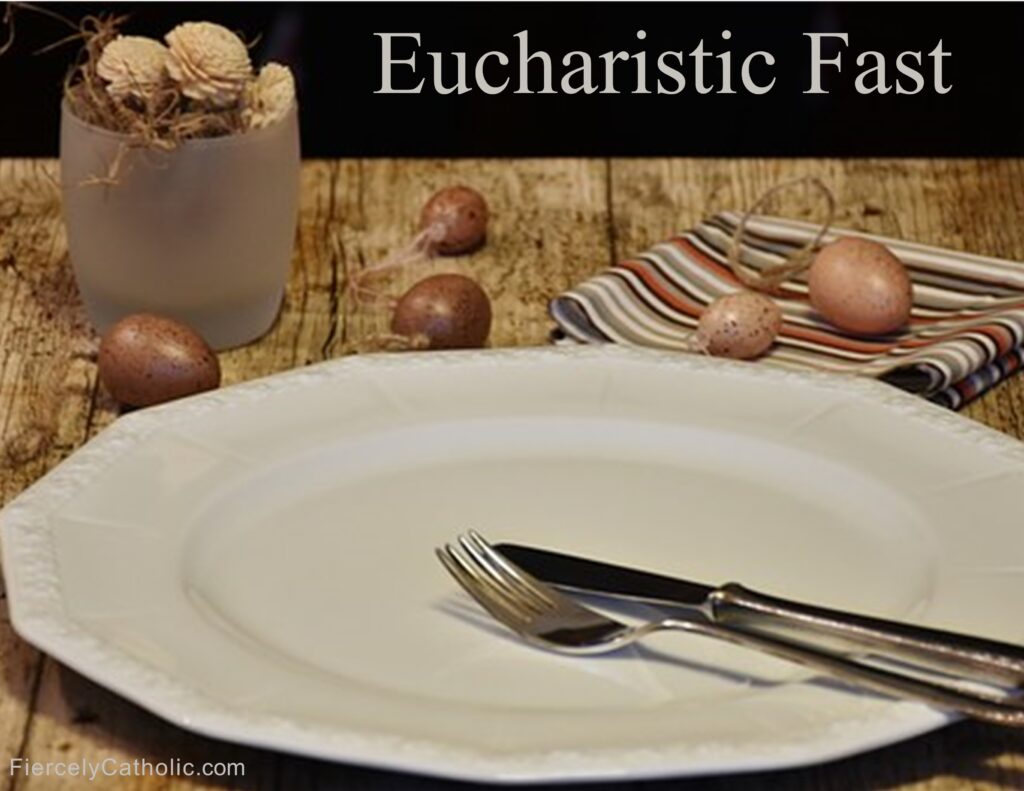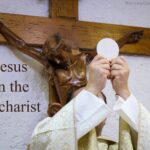
Because Jesus is truly present in the Eucharist, Body, Blood, Soul, and Divinity, it is a sacred meal.
Before receiving Holy Communion, Catholics are required to prepare themselves by fasting from any food and drink, except for water or medicine, for at least one hour.
For many years, Catholics fasted from all food and drink, even water, from Midnight the night before until Mass.
Fasting is a form of sacrifice that was practiced by the Jewish people of the Old Testament. The early Christians adopted this ancient practice to prepare for receiving Jesus in the Eucharist at Mass.
By denying ourselves the pleasure of earthly food that only temporarily nourishes the body we remind ourselves that it is better to hunger and thirst for spiritual food that provides nourishment for eternal life.
The required fast is for one hour before receiving Holy Communion and not before the start of Mass, but Catholics may begin their fast earlier out of a sense of reverence and devotion.
Making our minds know what we are about to do:
A chance to prepare and make room for Jesus:
Jesus said to them, “I am the bread of life; whoever comes to Me will never hunger, and whoever believes in Me will never thirst.”
John 6: 35
The Eucharist is spiritual and material food:
The food we receive at Mass is different:
To prepare for worthy reception of this sacrament, the faithful should observe the fast required in their Church. Bodily demeanor (gestures, clothing) ought to convey the respect, solemnity, and joy of this moment when Christ becomes our guest.
Catechism of the Catholic Church 1387
Prepared in heart and mind:
Setting Catholics apart in an age of instant gratification:
In fact, the custom of distributing the Eucharist to the fasting faithful was established from very ancient times. Already towards the end of the century it was established in various councils that those who were to celebrate the Eucharistic sacrifice should observe fasting. In the year 393 the Council of Hippo decreed: “The Sacrament of the Altar should not be celebrated except by fasting people”. This precept came shortly after, that is in the year 397, promulgated with the same words by the III Council of Carthage; “at the beginning of the fifth century this custom could be said to be quite common and from time immemorial , for which St. Augustine was able to affirm: “The Most Holy Eucharist is always received by fasting people.”
Pope Pius XII, Christus Dominus, January 6, 1953
The laws of fasting before Holy Communion have changed:
Exemptions from fasting are made when necessary:
The Truth, Goodness, and Beauty of the Catholic Church
Giving their lives for our faith, everyday:
Share this page with friends and family to start a conversation about your faith.
Don’t miss a post. Learn more about the Catholic Church and strengthen your Catholic faith.
Find more Fiercely Catholic video issues here.
Subscribe here.


